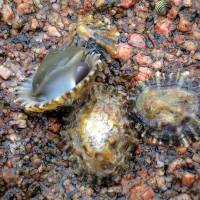Spider silk may lose its claim as the strongest known natural material after researchers found that limpet teeth are tougher.
Spider silk is hailed for its strength and structure, but researchers in Britain have discovered that limpets — snaillike sea creatures with conical shells that live on intertidal rocks — have teeth with structures so strong they could be copied and used in making cars, boats and planes.
"Until now, we thought that spider silk was the strongest biological material because of its superstrength and potential applications in everything from bulletproof vests to computer electronics," said Asa Barber, a professor at Portsmouth University's school of engineering, who led the study. "But now we have discovered that limpet teeth exhibit a strength that is potentially higher."
Barber's team examined the detailed mechanical behavior of limpet teeth with atomic force microscopy, which pulls apart materials all the way down to the level of the atom. They found the teeth contain a hard mineral known as goethite, which forms in the limpet as it grows.
The research was published on Wednesday in the Royal Society's scientific journal, Interface.
"Limpets need high-strength teeth to rasp over rock surfaces and remove algae for feeding when the tide is in," Barber said. "We discovered that the fibers of goethite are just the right size to make up a resilient composite structure."
The fibrous structures found in limpet teeth could in the future be copied by materials scientists and used in high-performance engineering applications such as Formula 1 racing cars, the hulls of boats and the bodies of aircraft, Barber said.

















With your current subscription plan you can comment on stories. However, before writing your first comment, please create a display name in the Profile section of your subscriber account page.